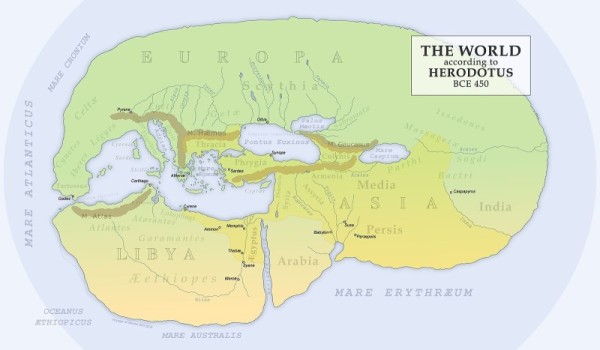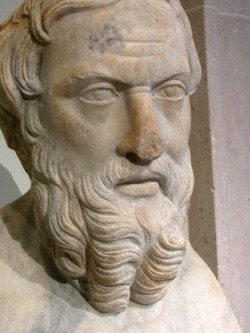This the natives say is the pillar of the heaven. After this mountain these men got their name, for they are called Atlantians; and it is said that they neither eat anything that has life nor have any dreams.

Translated by George C. Macaulay — our special project presenting the complete Herodotus with URLs for all of those people, places, events, and things which baffles and discourages modern readers.
Previously on Herodotus
180. Next to these Machlyans are the Auseans. These and the Machlyans dwell round the lake Tritonis, and the river Triton is the boundary between them: and while the Machlyans grow their hair long at the back of the head, the Auseans do so in front. At a yearly festival of Athene their maidens take their stand in two parties and fight against one another with stones and staves, and they say that in doing so they are fulfilling the rites handed down by their fathers for the divinity who was sprung from that land, whom we call Athene: and those of the maidens who die of the wounds received they call false-maidens. But before they let them begin the fight they do this: all join together and equip the maiden who is judged to be the fairest on each occasion, with a Corinthian helmet and with full Hellenic armour, and then causing her to go up into a chariot they conduct her round the lake. Now I cannot tell with what they equipped the maidens in old time, before the Hellenes were settled near them; but I suppose that they used to be equipped with Egyptian armour, for it is from Egypt that both the shield and the helmet have come to the Hellenes, as I affirm. They say moreover that Athene is the daughter of Poseidon and of the lake Tritonis, and that she had some cause of complaint against her father and therefore gave herself to Zeus, and Zeus made her his own daughter. Such is the story which these tell; and they have their intercourse with women in common, not marrying but having intercourse like cattle: and when the child of any woman has grown big, he is brought before a meeting of the men held within three months of that time, and whomsoever of the men the child resembles, his son he is accounted to be.
181. Thus then have been mentioned those nomad Libyans who live along the sea-coast: and above these inland is the region of Libya which has wild beasts; and above the wild-beast region there stretches a raised belt of sand, extending from Thebes of the Egyptians to the Pillars of Heracles. In this belt at intervals of about ten days’ journey there are fragments of salt in great lumps forming hills, and at the top of each hill there shoots up from the middle of the salt a spring of water cold and sweet; and about the spring dwell men, at the furthest limit towards the desert, and above the wild-beast region. First, at a distance of ten days’ journey from Thebes, are the Ammonians, whose temple is derived from that of the Theban Zeus, for the image of Zeus in Thebes also, as I have said before, has the head of a ram. These, as it chances, have also other water of a spring, which in the early morning is warm; at the time when the market fills, cooler; when midday comes, it is quite cold, and then they water their gardens; but as the day declines, it abates from its coldness, until at last, when the sun sets, the water is warm; and it continues to increase in heat still more until it reaches midnight, when it boils and throws up bubbles; and when midnight passes, it becomes cooler gradually till dawn of day. This spring is called the fountain of the Sun.
182. After the Ammonians, as you go on along the belt of sand, at an interval again of ten days’ journey there is a hill of salt like that of the Ammonians, and a spring of water, with men dwelling about it; and the name of this place is Augila. To this the Nasamonians come year by year to gather the fruit of the date-palms.

CC BY-SA 2.0 image from Wikipedia.
183. From Augila at a distance again of ten days’ journey there is another hill of salt and spring of water and a great number of fruit-bearing date-palms, as there are also in the other places: and men dwell here who are called the Garmantians, a very great nation, who carry earth to lay over the salt and then sow crops. From this point is the shortest way to the Lotophagoi, for from these it is a journey of thirty days to the country of the Garmantians. Among them also are produced the cattle which feed backwards; and they feed backwards for this reason, because they have their horns bent down forwards, and therefore they walk backwards as they feed; for forwards they cannot go, because the horns run into the ground in front of them; but in nothing else do they differ from other cattle except in this and in the thickness and firmness to the touch of their hide. These Garamantians of whom I speak hunt the Cave-dwelling Ethiopians with their four-horse chariots, for the Cave-dwelling Ethiopians are the swiftest of foot of all men about whom we hear report made: and the Cave-dwellers feed upon serpents and lizards and such creeping things, and they use a language which resembles no other, for in it they squeak just like bats.
184. From the Garmantians at a distance again of ten days’ journey there is another hill of salt and spring of water, and men dwell round it called Atarantians, who alone of all men about whom we know are nameless; for while all taken together have the name Atarantians, each separate man of them has no name given to him. These utter curses against the Sun when he is at his height, and moreover revile him with all manner of foul terms, because he oppresses them by his burning heat, both themselves and their land. After this at a distance of ten days’ journey there is another hill of salt and spring of water, and men dwell round it. Near this salt hill is a mountain named Atlas, which is small in circuit and rounded on every side; and so exceedingly lofty is it said to be, that it is not possible to see its summits, for clouds never leave them either in the summer or in the winter. This the natives say is the pillar of the heaven. After this mountain these men got their name, for they are called Atlantians; and it is said that they neither eat anything that has life nor have any dreams.
– Herodotus, Book IV
| <—Previous | Master List | Next—> |
Herodotus made his living by being interesting. In a world where most people did not read and could not afford to buy a book even if they could, they would pay to listen to Herodotus recite from his books. They would not pay to be bored. In that world, the names that populate his stories would have some general familiarity to his audience. Their obscurity to us is a barrier that this series seeks to break down.
MORE INFORMATION
MAP LIBRARY
Because of lack of detail in maps as embedded images, we are providing links instead, enabling readers to view them full screen.

Leave a Reply
You must be logged in to post a comment.